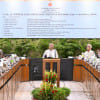The fall of a dictator should not give rise to another

The new administration under the leadership of Nobel laureate Dr Muhammad Yunus has the aspirations of many entrusted upon him to deliver justice, create the space for a functioning economy and democracy, establish rule of law, and a transparent and accountable government. The recent violence and history of coups and staged elections give an eerie feeling that the country is not completely out of danger.
The blood and sacrifice of hundreds of people freed Bangladesh from the tyrannical leadership of former Prime Minister Sheikh Hasina. It is even more important now that Hasina and those in the command responsibility during her time in the government are not let off the hook and are brought to justice and accountability for the unlawful killings, detention and torture of hundreds of people in the country. More than 500 people were killed in 23 days since July 16, according to Prothom Alo. The violence against minorities after Hasina's exit must also be subject to investigation.
The interim government of Bangladesh has the opportunity to do this by proactively inviting the United Nations to establish a commission of inquiry and extending its full cooperation with the procedure. UN High Commissioner for Human Rights Volker Turk has reiterated his office's support for a comprehensive investigation. The international community must press for the same to uphold global justice and accountability under the rules-based international order.
Justice and accountability do not begin with Sheikh Hasina and her government only. The political parties that have ruled the country before her time, too, have committed serious human rights violations and promoted a culture of impunity. There is both fear and frustration that the traditional political parties will exploit this moment to return to power and make matters worse, given their competing track records of corruption and crimes.
For the longest time, the people have shown tremendous resilience to put up with corruption, politicised judiciary, and repressive laws and law enforcement that resulted in egregious human rights violations including torture, enforced disappearances, and unlawful killings. The crimes under the leadership of Sheikh Hasina must not subside those committed by her predecessors.
The young generation that has led the movement for systemic change, and was subsequently joined by the wider population, deserves nothing short of a leadership that breaks away from the ugly legacy of the traditional political parties. The fall of a dictator should not give rise to another. The Yunus-led government must ensure that Bangladesh does not fall back on the dictatorial aspirations of political parties and ideologies that undermine cultural, political and religious freedoms.
The young generation must be afforded with safe and secure environment, free of intimidation and oppression, to come up with new ideas, leaders and political parties that are representative of gender, age, ethnic, religious and socioeconomic diversity. A gender-balanced leadership is indispensable in this process to ensure diversity, inclusivity, and representation. Reforms should be considered in the electoral process to ensure representation of the people.
Constitutional reforms will be required to ensure free and fair elections and reinstate the function of an interim government to administer the transition to a democratically elected government in the future. A national referendum can guide some of these decisions as the basis for public consensus. Institutional reforms will be required throughout the administration to develop systems for transparency and accountability in the process.
The interim government must immediately scrap all repressive provisions under laws such as the Cyber Security Act (CSA), drop the charges against all those accused under the problematic provisions of the law as well as its predecessors—the Digital Security Act (DSA) and the Information and Communication Technology (ICT) Act. New laws and constitutional reforms must be drafted in line with international human rights law and standards and should be adopted through wider public consultation.
It is a relief to see that some of the people have been freed from the secret detention facilities of the security agencies—some after nearly a decade of their enforced disappearances. Their release in the middle of the road with eyes blindfolded are attempts by the perpetrators to evade criminal responsibilities. The detention facilities must be dismantled and those who were in charge of the facilities must be investigated and brought to justice.
The economist in Muhammad Yunus is now most required to stop the free fall of the economy and recover the state at a time when even the global economic and political orders are extremely chaotic.
The interim government must be afforded the time to make foundational changes that are inevitable for a smooth transition to a democratically elected government and for the country to move forward. This cannot be an indefinite period. The interim administration must set a deadline for itself. The success of the new leadership will depend on the trust and confidence it is able to build with the people.
Saad Hammadi is fellow at the Balsillie School of International Affairs. His X handle is @saadhammadi.
Views expressed in this article are the author's own.
Follow The Daily Star Opinion on Facebook for the latest opinions, commentaries and analyses by experts and professionals. To contribute your article or letter to The Daily Star Opinion, see our guidelines for submission.

 For all latest news, follow The Daily Star's Google News channel.
For all latest news, follow The Daily Star's Google News channel. 











Comments